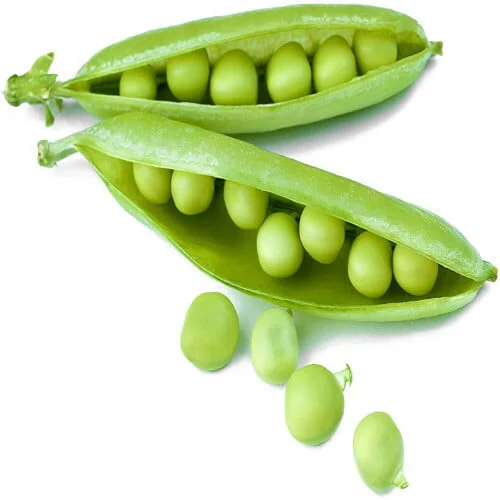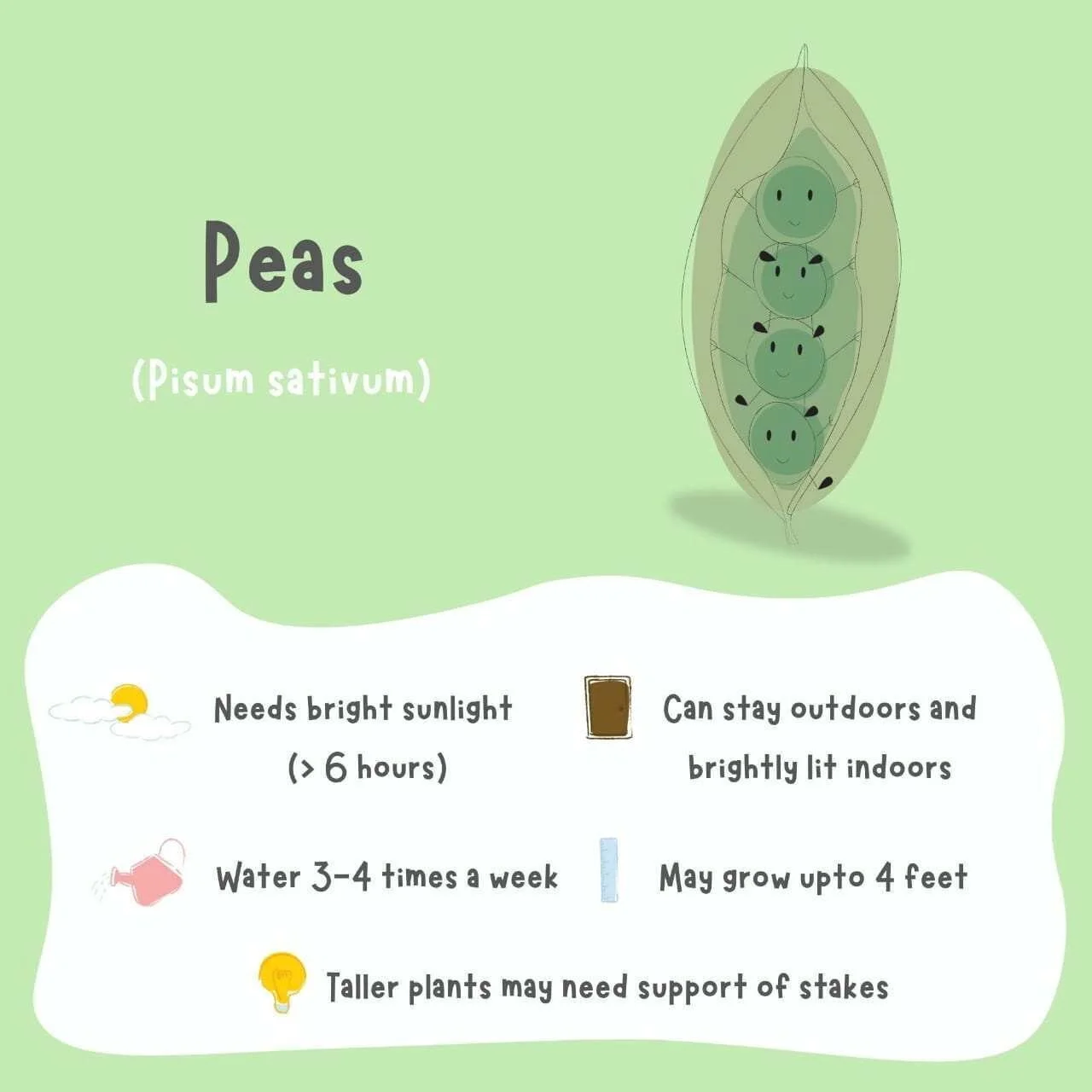Pea Seeds (5 Seeds)
₹15.0
Peas are a popular green vegetable. They are also nutritious and contain a fair amount of fiber and antioxidants. Try our Non-GMO pea seeds. Also, check out our workshops for more details.
PRODUCT DESCRIPTION
Number of seeds in a packet – 5
PLANT DESCRIPTION
- Difficulty Level – easy
- Plant Height – up to 4 feet
- Pod Color – green
- Flower Color – varies
- Type – indoor & outdoor
- Feed – Vermicompost for nutrients every week, Seaweed once a month for greener leaves and Epsom salt for better blooming once a month
- Watering – 3 – 4 times a week
- Sunlight – full Sunlight
- Germination Time – 1 – 2 weeks
- Fruiting Time – 12 – 14 weeks
- Suitable Temperature – 45°F – 85°F
- Season – winter to early spring
- Sowing – october – november (in plain areas) and march – may (in hills)
HOW TO GROW PEAS FROM SEEDS
- Soak the seeds in water overnight before planting.
- Take a Growbag and fill it with Potting Mix.
- Sprinkle the seeds around the Growbag.
- Cover the seeds lightly with Potting Mix and spray with water using a spray gun or spray bottle.
- Water 3 – 4 times a week.
- Seeds will germinate within 1 – 2 weeks.
- Full Sunlight is needed.
ALTERNATE METHOD
- Take a Medium Size Pot and add a Potting Mix.
- If planting in the soil add Neem Cake Powder, Vermicompost, and Seaweed.
ALTERNATE NAME
Botanical name: Pisum sativum
pea seed in hindi: matar ka beej (मटर का बीज)
pea seed in tamil: pattani vitai (பட்டாணி விதை)
pea seed in telugu: bathani ginnja (బఠానీ గింజ)
pea seed in kannada: batani bija (ಬಟಾಣಿ ಬೀಜ)
pea seed in marathi: vatana biyane (वाटाणा बियाणे)
pea seed in malayalam: kadala vithu (കടല വിത്ത്)
You must be logged in to post a review.
Q & A
The sustainability of vegetable seeds depends on several factors, including their origin, cultivation practices, and conservation efforts. Here are some aspects to consider:
Genetic Diversity: Ensuring the sustainability of vegetable seeds involves maintaining a diverse genetic pool. Genetic diversity allows plants to adapt to changing environmental conditions, pests, and diseases. Efforts are made to preserve and promote heirloom and open-pollinated varieties, as they tend to have more genetic diversity than hybrid seeds.
Seed Saving: Saving and preserving seeds from year to year is an important practice for sustainability. Farmers and gardeners can collect seeds from their best-performing plants and store them for future use. This practice helps maintain a locally adapted seed stock and reduces dependence on commercial seed suppliers.
Open-Source Seed Initiative: The Open-Source Seed Initiative (OSSI) is a movement that aims to promote and protect the freedom to save, share, and exchange seeds. It encourages the use of open-source licenses for seeds, preventing their restriction through intellectual property rights. This initiative supports sustainable seed practices and fosters collaboration and innovation in seed breeding.
Organic and Regenerative Agriculture: Sustainable agricultural practices, such as organic and regenerative farming methods, prioritize soil health, biodiversity, and ecosystem resilience. By avoiding synthetic pesticides and fertilizers, organic farming supports the long-term viability of vegetable seeds and promotes ecological balance.
Seed Banks and Conservation: Seed banks play a crucial role in conserving and preserving the genetic diversity of vegetable seeds. These institutions collect, store, and catalogue seeds from various plant species, including vegetables. They act as repositories for genetic resources, ensuring that valuable seed varieties are safeguarded for future generations.
Access to Seeds: Ensuring access to a wide range of vegetable seeds is essential for sustainable agriculture. This includes providing farmers and gardeners with affordable and diverse seed options. Initiatives such as community seed banks, seed swaps, and seed libraries contribute to seed accessibility and empower local communities.
Education and Awareness: Raising awareness about the importance of seed sustainability and promoting education on seed saving techniques are vital for fostering a culture of seed conservation. Training programs, workshops, and educational resources help empower individuals to participate in seed-saving practices and support sustainable agriculture.
By implementing these practices and supporting initiatives that prioritize seed sustainability, we can contribute to the long-term viability of vegetable seeds and promote a more sustainable food system.
General Inquiries
There are no inquiries yet.




Reviews
There are no reviews yet.